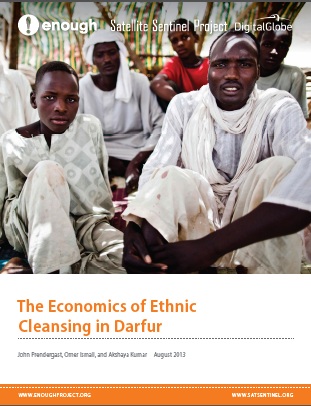
This year, the resurgence of violence by the Janjaweed militias in Darfur has displaced over 300,000 people. A new report by the Enough Project, “The Economics of Ethnic Cleansing in Darfur,” examines the patterns of recent violence and confirms the Sudanese government’s economic and security incentives for sponsoring violence and instability in Darfur.
The expansion of violence to Arab tribes historically aligned with the government accounts for the characterization of “inter-tribal” hatreds fueling the conflict. Currently, the government in Khartoum controls this narrative, citing inevitable “inter-tribal” hatreds as the root cause of violence throughout the region. The Enough Project report counters this, citing the economic incentives for the Sudanese government to systematically create and maintain instability in Darfur. By playing regional groups off of each other, the government can capitalize on the lucrative resources throughout the region.
With the loss of oil revenues following southern secession, new financial constraints changed the relationship between the government and militias operating in Darfur. During the genocide, the government of Sudan funded the Janjaweed militias to carry out its security objectives. Now due to lack of funds, the report states:
“Instead of direct payments, [the government] has shifted to securing its interests by allowing these militias to loot and pillage with complete impunity, and keep the spoils as a form of compensation. In exchange for government indifference to their illegal activities, these militias continue to help in the counter-insurgency against the rebels and with government attempts to secure natural resources.”
These looting and extortion schemes also protect the government from Janjaweed discontent and retaliation, shifting the burden to fulfill the Janjaweed’s demand for payment onto the Darfuri population. Now, clashes between tribes regularly occur around the gold mines in North Darfur, gum arabic groves in South Darfur, and fertile lands of Central Darfur. The purpose of these clashes can be categorized into two types: land grabbing and money-making schemes to pacify Janjaweed militiamen.
John Prendergast, Enough Project Co-Founder states:
"Crafting a durable solution to the unfolding human catastrophe in Darfur requires understanding the economic drivers of the violence. Khartoum is spurring an array of revitalized Janjaweed militias to grab fertile land, consolidate control over gold mines, manipulate reconciliation conferences for increased “blood money,” expand protection rackets and exploit smuggling networks with impunity. Civilians are suffering the consequences"
In Central Darfur, the Misseriya Janjaweed elements are conducting a systematic land grabbing campaign, clearing the Salamat community from their homes. According to interviews with refugees conducted by the Enough Project in Chad, the Misseriya Janjaweed elements responsible for the campaign are aligned with the forces of Sudanese Central Reserve Police official and ICC indictee, Ali Kosheib. One refugee from the town of Um Dukhun described the systematic nature of the attacks,
“The Misseriya militia wants to empty all the other groups from the area. The plan of the government is to clear the population, and the Misseriya are their instrument.”
Working as proxies of the government, these militias are responsible for the burning of sixteen villages in Central Darfur, razing homes and destroying water pumps, and prohibiting the residents to return. Central Darfur serves as a clear example of the tactics and events happening throughout the resource-rich areas of Darfur, where financial gains are most immediately secured through violence. By systematically expelling populations and destroying towns with lucrative resources – gold, gum arabic, and fertile land –government-aligned militias harness control over the resources to occupy and distribute as they please.
Darfur once again needs international attention. This time, international actors need to acknowledge the failures of previous attempts for peace and stability in Darfur, and expand the efforts to address all of the contributing factors to violence. Previous efforts dealt with the conflicts within Darfur in isolation from each other, and considered Darfur separately from conflicts throughout the country, which further entrenches the divide-and-conquer strategy utilized by the Sudanese government to maintain control. To combat this alienation, the Enough Project calls for a comprehensive and holistic approach towards peace in Sudan, highlighting initiatives to address economic drivers of conflict and hold criminals such as Ali Kosheib accountable.
The Enough Project calls for the AUHIP, U.N. Envoy Haile Menkerios, and soon-to-be-announced U.S. Special Envoy to push for a new comprehensive, internationally-backed peace process which does not segment the conflicts in Sudan, but addresses them holistically, and includes greater engagement with armed and unarmed opposition in Sudan.

